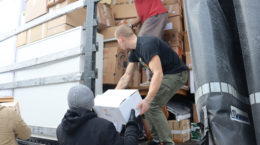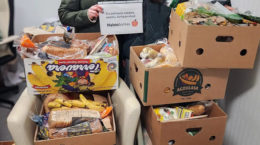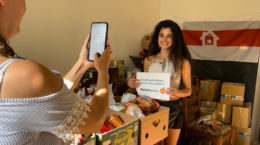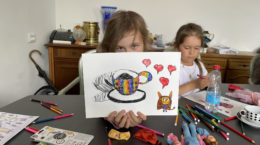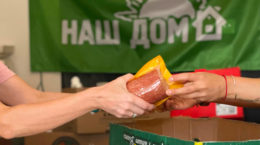On July 2, 2021, a ‘state of emergency’ was introduced in Lithuania, and the Lithuanian authorities decided to build a wall on the border with Belarus, as the Belarusian dictator Alexander Lukashenko launched a full-scale attack on Lithuania by organizing the illegal transport to the border of thousands and thousands of economic migrants from Africa and Asia, who had been promised the ‘easy way’ to the European Union. Lithuania was not attacked by accident. It was Lukashenka’s sophisticated revenge for the fact that Lithuania began to massively accept political refugees from Belarus.
In 2020, Belarus held another presidential election, the results of which were once again rigged, the most popular opposition candidates were imprisoned and exiled, and Belarus saw the largest protests ever, with around 1 million people taking part, many of whom subsequently had to flee the country due to terror and repression. According to statistics, about 45,000 Belarusians have arrived in Lithuania on various grounds since 2020. And let’s be honest – it is not so important what visas and documents they came with – all these people came to Lithuania for political reasons ether escaping existing persecution or anticipating future political harassment.
Today, Belarusians flee across the Lithuanian-Belarusian border in much the same way as the Germans fled from East Berlin in their time: the wall grows stronger every day, it becomes more difficult to escape, but people continue to flee. Some run through the forest finding loopholes in the border wall, some make homemade paragliders and fly over the wall, some throw children and dogs over the wall with the last bit of energy, tearing their hands in blood on barbed wire, and then try to climb over the wall themselves breaking their legs. Increasingly, Belarusians are trying to swim across the river, sometimes in wetsuits, sometimes just in ordinary clothes. The water is icy, winter in Lithuania and Belarus is not winter in Germany, so today the Neman is littered by backpacks with documents that Belarusian political refugees lost while trying to swim across the river in winter. This is also said by the Lithuanian State Border Guard.
But the misadventures of the Belarusian refugees do not end there. It is very difficult for an escapee to maintain contact with those relatives who remained in Belarus. The vengeful regime takes the relatives of those who fled as hostages. In particular, relatives of those who continue to actively fight against Lukashenko abroad, at home, are imprisoned, dismissed from work, and subjected to pressure by any other means. In turn, relatives in Belarus are afraid of contacting those who fled because they fear the KGB. Furthermore, if you are a Belarusian political refugee in Lithuania, it would be almost unrealistic to make visas to Lithuania for your mother, wife, sister, etc., who stayed in Belarus, because Lithuania does not give visas for such categories of people.
But the Belarusian refugees find themselves in a strange situation in Lithuania: there are no programs of state support for such people, and only Belarusian organizations in exile such as Our House, Dapamoga, Medics on the Barricades, Free Belarusians of Lithuania and many others from the last forces have been pulling Belarusian refugees for last three years. And now, when Alexander Lukashenko invited Russian troops to Belarus and graciously provided both Belarusian territories to attack Ukraine and Belarusian industry to meet the needs of the Russian Ministry of Defense, Belarusians also listen to accusations, that they could not stop neither Lukashenko nor Russian aggression. These reproaches are not so harmless: there are constantly voices to tighten the legislation on visas and asylum for Belarusians, Belarusians are excluded from assistance programmes and scholarship opportunities, and many others.
In Lithuania there are no state shelters for the Belarusians who have fled, there is clearly not enough help for the Belarusians. It is possible to live in refugee camps, but traumatized and frightened Belarusians badly need psychological help and sensitive support, it is difficult to organize this in such camps. What the Belarusians themselves try not to talk about is the wave of suicides and attempted suicides among the Belarusian political refugees. The most recent high-profile case was one of a young worker who took part in a strike after the presidential elections in 2020: the man committed suicide in Poland in August 2022, because he had been finding himself in utter isolation, loneliness and deprivation without any help.
The Belarusians themselves are very embarrassed to talk about their problems. Firstly, ones still cannot believe that they are alive, free and not under torture, and are very grateful to Lithuania for the opportunity to simply live without violence. Secondly, the Belarussians are afraid both to contact and communicate with any state authorities after the terror and violence that they faced at home. In Belarus, any communication with state authorities, even a simple petition, often ends up in night searches, looting of security forces (when the police find money from the owner of the flat, divide it among themselves, and threaten the owner with additional violence and beatings if one even mentions about the disappearance of money), criminal cases and threats to take the children to the orphanage. Therefore, Belarusians often think that if in Belarus they faced such violence from seemingly ‘own’ state authorities (at least, from the same Belarusian citizens), the same will be true if they ask for help from Lithuanian state authorities, for which they are not even citizens of Lithuania.
But the problems of the Belarusians in Lithuania, if everyone keeps quiet about them, do not disappear from this, but increase.
If a Belarusian comes to Lithuania illegally, one will have the only option of applying for political asylum in Lithuania, otherwise a person will be criminally prosecuted for illegal border crossing. In practice, this means that a Belarusian will have to wait about a year for a decision on one’s status, and will not be allowed to work legally in Lithuania for at least six months, and after the six months certain restrictions will be imposed on possibility to work. In fact, Lithuanian employers do not want to deal with the registration of a Belarusian with a strange status and to understand the intricacies of Lithuanian tax legislation. It is easier for them to take a Ukrainian refugee, who has the right to work from the very first day of arrival in Lithuania, and there are no such complicated procedures for Ukrainians.
The ban on work, lack of rights, insufficient assistance and, in fact, forced work illegally cause a lot of consequences for Belarusians not only legal, but also psychological ones. This year of waiting for political refugee status is becoming a real survival quest. – In particular, it is not clear, for example, where a Belarusian refugee has to get the money to pay rent and utilities, which this winter amounted to a total of 700-800 euros per family. Until December 31, 2022 assistance to the Belarusian asylum seeker was 20 euros per month for food and hygiene, but from January 1, 2023 it ended.
Cases of Belarusian parents forging school food vouchers for their children have appeared., Because the Belarussian mother has no money to give her child food or buy a food voucher, and if she doesn’t give it to child, the entire class goes to eat and the child is left alone in the class hungry with feeling of both a huge humiliation and an equally huge social inequality. They also try not to talk about it, because how can you tell about such situations?
Yes, free medical care is provided to a Belarusian asylum seeker. This is important because many Belarusians agree to work illegally, for example on construction sites. But they are usually not physically prepared, so injuries are not uncommon, people break arms and legs. Because the work is illegal, there is no compensation for broken limbs. In this situation, free medicine helps, but the question remains where to get money to buy medicine.
But the most affected and isolated group are the Belarusian refugee children. Belarusian children have the same phobia: they are very afraid to fall asleep at night. Very many Belarusian refugee children in Lithuania survived night searches in Belarus, when the KGB and OMON broke into apartments at night, beat parents in front of them, and often took one parent away forever. Now the children are afraid to sleep because they are afraid that the ‘an unknown masked men’ will come again. The children also had to flee illegally across the border as the Belarusian regime seized children from parents who had actively participated in the protests. In Lithuania the children were completely abandoned, the Belarusian parents were busy all these three years with their own survival, hard work at several jobs, trying to help those who stayed in Belarus and continued to fight for human rights, helping the repressed, protest actions, then helping Ukrainian refugees and many other things. Objectively, there was no time, strength and energy left for children. But even where there is an opportunity, parents are afraid to let their children go, so many children just sit at home and do not go anywhere.
But domestic violence within the families of former political prisoners remains the most difficult topic. Men who were crippled by the Belarusian police (e.g. with a fractured spine) need additional free rehabilitation, taking into account these features, but there is no such help. In such families, the psychological environment is usually unbearable. Now the wife is the sole breadwinner and has to work day and night to support a family with 3 more children, and the husband’s character is very damaged by the constant pain and the knowledge that he is disabled forever. Families are falling apart, wives cannot bear such a triple burden (emigration, feeding the family, often on occasional illegal earnings, and also caring for the disabled husband and children and restraining the husband’s emotional reactions to pain). The situation is further complicated by the fact that both the wife and husband are well aware that the husband’s disability and unbearable pain because of his participation in the Belarusian protests, while before that everything was fine and normal. Families are trapped and need help and participation to get out of these traps without additional feelings of guilt and self-destruction.
The Belarusian regime also does not abandon its attempts to put pressure on the Belarusians in Lithuania. On September 28, 2022, Mantas Danielis, a Lithuanian lawyer of Our House, was detained in Vilnius by the Lithuanian Department of State Security. This lawyer had been recruited by the Belarusian KGB to monitor Belarusian human rights organizations in Lithuania and their activities, most of all, of course, Our House. The Belarusian KGB has announced a Road Home program, offering all Belarusians who have fled from political persecution in the EU to agree to spy in Lithuania for the KGB in exchange for the closure of all criminal cases in Belarus and a safe return home. In December 2022 alone there were 58 such people, who agreed to be a secret agent of the KGB in the European Union, collecting and transmitting information about the Belarusian refugees in Lithuania and Poland, as well as about the activities of Belarusian human rights organizations such as Our House. All these 58 people on their return to Belarus were immediately detained and imprisoned for their participation in the protests, because the Belarusian KGB, as a successor of the Soviet KGB, never keeps its promises and easily uses people. But it is the snitching and spying of such Belarusians that creates an additionally very difficult atmosphere in the Belarusian diaspora: no one trusts anyone and everyone suspects another of working for the KGB.
It all comes together in a very heavy lump, and we really need international help and solidarity to cope with it all.
But I know one thing for sure: today there is a unique chance for Belarusians in exile in Lithuania to see how democracy works in practice, a unique chance to realize and get rid of colonial thinking, dependence on imperial Russia, to build and strengthen Lithuanian-Belarusian business contacts, to be integrated not in words, but in practice into European political culture, social system and become truly part of Europe.
Let us all together not miss this historic chance for the Belarusians.





